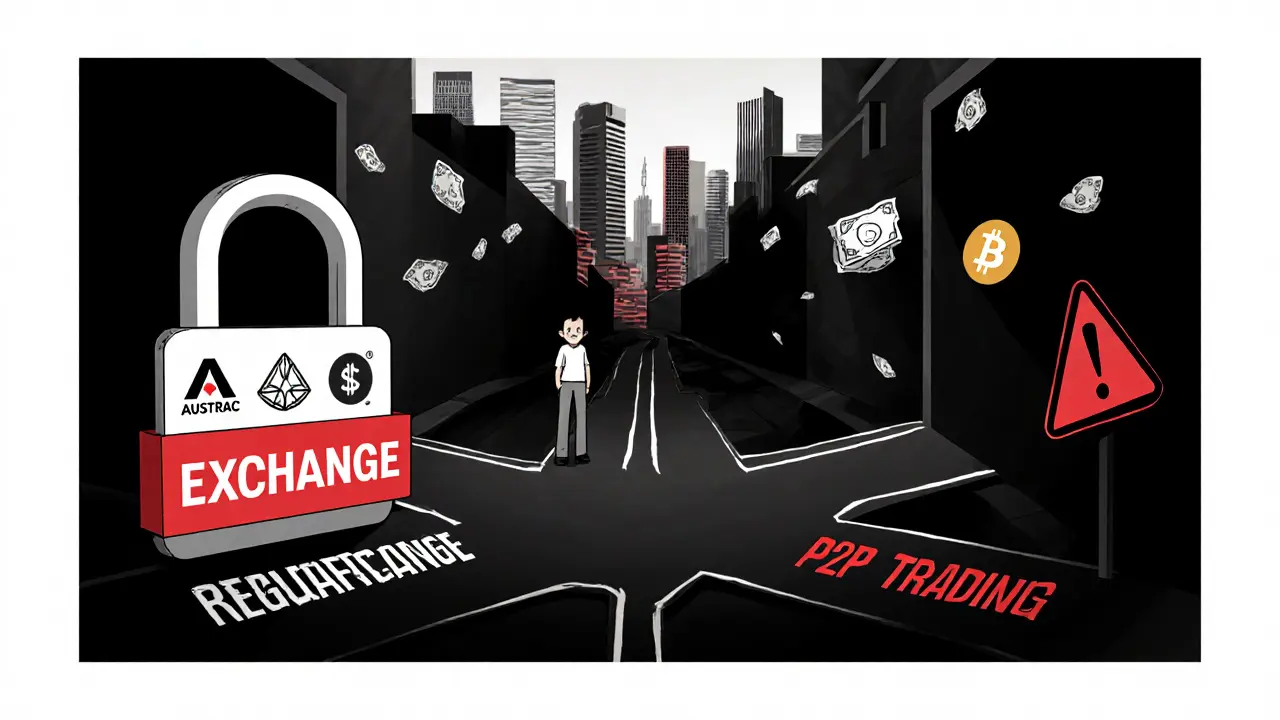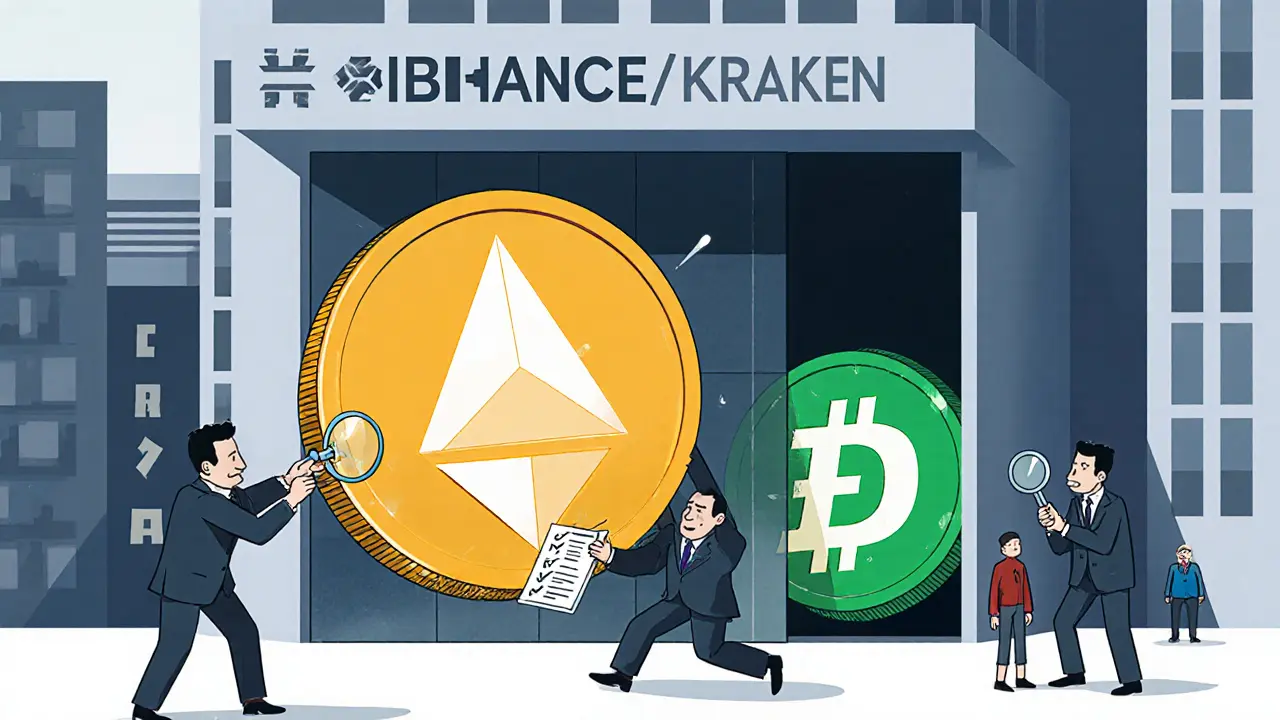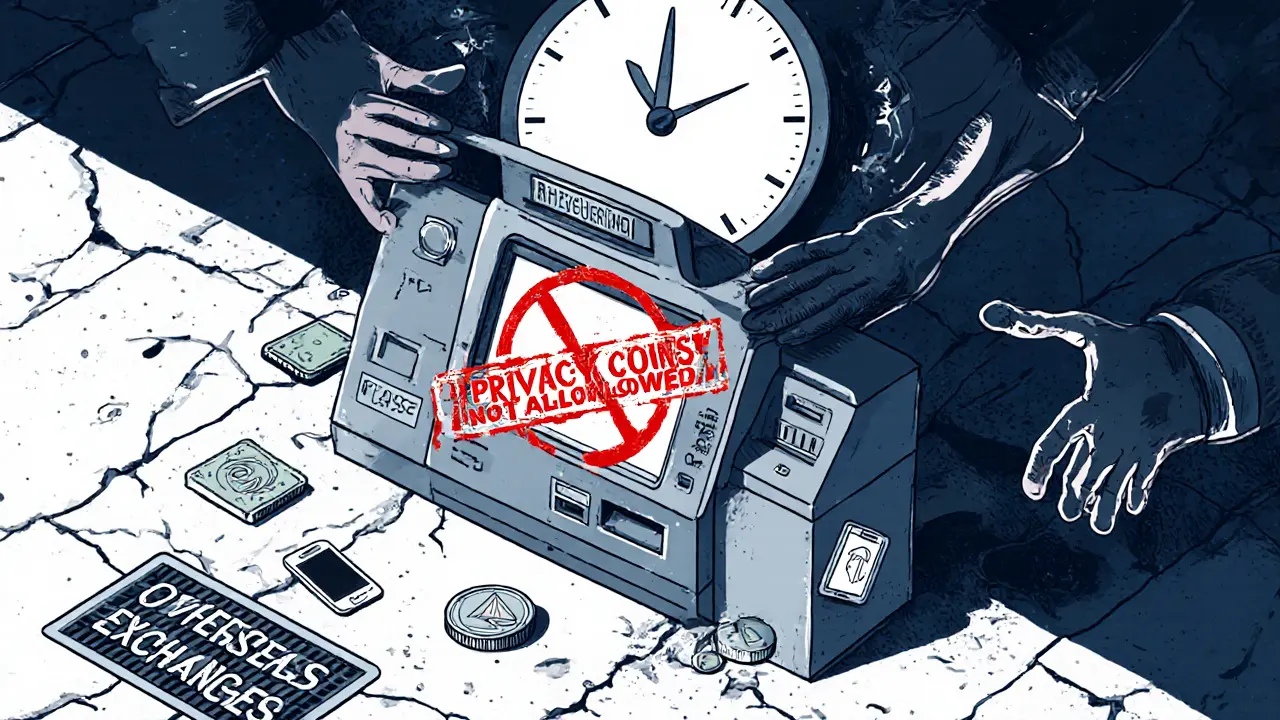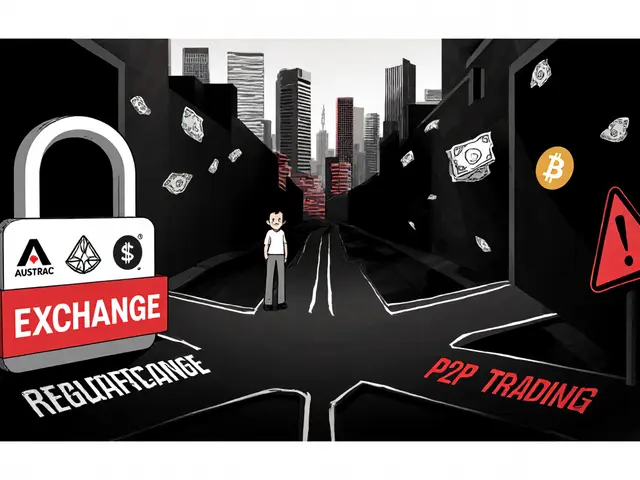Privacy Coins Banned on Australian Crypto Exchanges: What You Need to Know

Privacy Coin Compliance Calculator
Understanding Regulatory Risks
Privacy coins like Monero, Zcash, and Dash are blocked on Australian exchanges due to AML/CTF compliance requirements. This tool calculates your risk when trading these coins under current regulations.
Your Trading Options
Regulatory Impact Analysis
Risk Assessment
Critical Warning
Starting March 31, 2026, AUSTRAC's regulations will expand to cover all digital asset services.
Recommended Actions
- Consider holding privacy coins only in non-custodial wallets
- Avoid using Australian bank accounts for transactions
- Verify P2P platform security before trading
- Research overseas exchanges with clear KYC processes
Privacy coins are effectively banned on Australian crypto exchanges - but not because they’re illegal to own.
If you live in Australia and you want to buy Monero, Zcash, or Dash, you can’t do it through Binance, Kraken, or any other licensed exchange. That’s not because the government outlawed them. It’s because the exchanges themselves pulled the plug. And it’s not just Australia - this is happening everywhere. But here, the rules are clear: privacy coins are blocked not by law, but by compliance pressure.
You can still hold privacy coins. You can even buy them from someone in a park using cash. But if you want to trade them on a regulated platform? Forget it. The Australian government didn’t pass a law saying "no privacy coins." Instead, it gave regulators like AUSTRAC and ASIC the power to shut down exchanges that don’t follow strict anti-money laundering rules. And privacy coins? They break those rules by design.
Why privacy coins can’t survive on regulated exchanges
Monero, Zcash, and Dash aren’t just private - they’re engineered to hide everything. Ring signatures scramble who sent the money. Stealth addresses make it impossible to trace where it went. Zero-knowledge proofs let you prove a transaction happened without showing any details. To a bank or regulator, that’s a nightmare. They can’t verify who’s sending money, who’s receiving it, or how much was transferred. And under Australia’s Anti-Money Laundering and Counter-Terrorism Financing Act, that’s a dealbreaker.
Exchanges have to know their customers. They have to log every transaction. They have to report suspicious activity. But with privacy coins, that’s technically impossible. Even if an exchange wanted to comply, the technology doesn’t let them. That’s why Binance, Kraken, and Poloniex all removed these coins from their platforms in early 2025. Not because they hate privacy - because they can’t legally offer them.
The U.S. Treasury Department even offered a $625,000 bounty to anyone who could break Monero’s privacy features. That tells you how serious this is. Law enforcement can’t track these transactions. Prosecutors can’t build cases. Banks won’t touch them. And exchanges? They’d rather lose a small slice of trading volume than risk losing their license.
Australia’s regulatory system: Legal to own, impossible to trade
Australia doesn’t ban privacy coins outright. You can buy them overseas. You can store them in your own wallet. You can even trade them peer-to-peer. But if you try to use a licensed exchange - like Independent Digital Assets Exchange (IDAX) or CoinSpot - you won’t find Monero or Zcash on the list. They were removed in 2025 after AUSTRAC made it clear: no compliance, no license.
Here’s how it works: AUSTRAC oversees digital currency exchanges under the AML/CTF Act. ASIC watches over financial products under the Corporations Act. Together, they’ve created a system where exchanges are forced to choose: follow the rules or get shut down. In 2022, ASIC stopped Holon Investments from selling crypto funds. In 2024, they took legal action against Qoin and Finder Wallet for offering unlicensed services. The message is loud and clear: if you’re operating in Australia, you play by our rules.
And the rules don’t allow anonymity. Not even a little bit. That’s why 78% of institutional clients on IDAX supported the removal of privacy coins. Big investors don’t want regulatory headaches. They want clean, traceable assets. Privacy coins are the opposite.

What’s happening around the world?
Australia isn’t alone. Japan banned privacy coins in 2018. South Korea’s top five exchanges removed them in early 2025. The European Union is set to ban them completely by July 2027. Canada’s FINTRAC forced Kraken to delist them in March 2025. Even Hong Kong and Dubai have moved to restrict them.
Global exchanges have responded by removing privacy coins everywhere - not just in regulated markets. Binance pulled them from U.S. and EU platforms in February 2025, cutting off $600 million in monthly trading volume. Poloniex followed in April. It’s not a regional issue anymore. It’s a global shift.
Some countries still allow limited access. Switzerland and Liechtenstein let exchanges offer privacy coins, but only if they meet strict KYC and transaction monitoring rules. But even there, adoption is low. Most users just go elsewhere.
What happens if you still want privacy coins in Australia?
If you’re determined to get Monero or Zcash, you have two real options: peer-to-peer trading or overseas exchanges.
Peer-to-peer platforms like LocalMonero have seen a 19% spike in Australian users since the delistings. But here’s the catch: you’re trading directly with strangers. No buyer protection. No chargebacks. No recourse if someone scams you. Prices can swing wildly because there’s no deep market. And if you’re buying with cash, you’re walking a legal tightrope - you might be complying with privacy coin rules, but you’re not complying with AML rules.
The other option is using an overseas exchange. But those aren’t regulated by Australian law. You won’t get consumer protections. If the platform gets hacked or shuts down, you have no legal recourse. And if you’re sending money from an Australian bank account, your bank might flag the transaction as suspicious.
Some users report getting locked out of their bank accounts after sending funds to international crypto platforms. Banks are getting better at spotting crypto-related activity - even if it’s not illegal, it’s risky.

Is this the end for privacy coins in Australia?
Not necessarily. But it’s the end of privacy coins on regulated platforms - at least for now.
Some developers are trying to build "compliant privacy coins" - versions that hide transaction details but still allow regulators to access data under court order. But that’s a contradiction in terms. If a government can see your transactions, it’s not privacy anymore. It’s surveillance with a fancy name.
Most experts believe the only way privacy coins survive in places like Australia is if regulators change their approach. Maybe one day, they’ll accept privacy-preserving technologies that still allow for targeted oversight. But that’s years away - if it happens at all.
For now, the message is simple: if you want to trade privacy coins in Australia, you’re on your own. The exchanges won’t help you. The regulators won’t protect you. And the banks might even watch you.
What’s next? March 2026 changes everything
Starting March 31, 2026, AUSTRAC’s rules will expand to cover every single digital asset service provider - not just exchanges. That means wallets, payment processors, even crypto ATMs will need to comply with full AML/CTF requirements.
That could mean the end of privacy coin ATMs in Australia. It could mean stricter limits on P2P platforms. It could even mean banks start blocking transfers to crypto wallets that hold privacy coins.
There’s no official ban yet. But the writing is on the wall. Privacy coins are being squeezed out of the system - not by force, but by friction. And in finance, friction kills adoption.

Benjamin Jackson
It's wild how we're trading freedom for convenience. Privacy isn't a bug-it's a feature. If we let governments dictate what kind of money we can hold, we're just building a financial panopticon one exchange at a time.
People act like this is about crime, but it's really about control. The same regulators who scream about money laundering are the ones who let banks launder trillions without blinking.
Kathy Ruff
I get why exchanges did this. Compliance is expensive and risky. But the real tragedy is that ordinary people who just want financial privacy-parents saving for kids, journalists in repressive states, whistleblowers-are the ones getting crushed by this policy.
Cydney Proctor
Oh please. 'Privacy coins' are just crypto's version of a drug dealer using a burner phone. If you need to hide your transactions, you're probably doing something you don't want audited. Stop romanticizing financial secrecy.
Colin Byrne
The notion that privacy is inherently illicit is a regulatory fantasy. The entire banking system is built on opacity-offshore accounts, shell corporations, trust funds, and hedge funds that operate with zero transparency. Yet when a decentralized protocol offers the same anonymity, suddenly it's a national security threat? The hypocrisy is staggering. The regulators aren't fighting crime-they're fighting innovation that threatens their monopolistic control over financial surveillance.
Ryan Inouye
Australia’s just being smart. If you want to hide money, go to Venezuela or North Korea. We don’t need criminals using our financial infrastructure. If you can’t trace it, it’s not money-it’s a fantasy. Get real.
Eric von Stackelberg
This is only the beginning. The global financial elite are consolidating control under the guise of AML. Soon, every blockchain transaction will be monitored, tagged, and routed through state-approved intermediaries. The $625,000 bounty on Monero? That’s not about catching criminals-it’s about breaking the encryption so they can backdoor every wallet. The endgame is a digital currency where every dollar has a GPS tracker.
Cierra Ivery
Wait-so you can buy Monero in a park with cash, but if you use an exchange? Illegal? That’s like saying you can own a gun but can’t buy ammo at Walmart. Who decided that? Some bureaucrat in Canberra? This isn’t regulation-it’s arbitrary, performative enforcement designed to make people feel safe while actually just making life harder for everyone who doesn’t trust the system.
Kevin Mann
I just got locked out of my bank account last week after sending $2k to a Canadian P2P seller for XMR. They called it 'suspicious activity.' I had to go to the branch with my tax returns, pay stubs, and a notarized letter explaining why I wanted privacy. I’m not a criminal-I’m a software engineer who doesn’t want the government knowing what I buy, who I pay, or how much I save. This is dystopia dressed up as compliance. 😭
Emily Unter King
The regulatory architecture is fundamentally incompatible with cryptographic privacy. AML/CTF frameworks rely on transactional transparency, which is antithetical to zero-knowledge proofs and ring signatures. Until regulatory technology (RegTech) evolves to support privacy-preserving compliance-e.g., selective disclosure protocols or homomorphic encryption audits-delistings are inevitable. This isn't anti-privacy sentiment; it's a technical constraint.
Rob Ashton
I see a lot of fear here, but let’s remember: this isn’t about banning privacy. It’s about protecting the system from abuse. The same people who scream about freedom are the ones who’d cry the loudest if their life savings got stolen through an untraceable transaction. We need balance-not elimination. Maybe the answer isn’t banning privacy coins, but building bridges so they can coexist with compliance.
Veeramani maran
bro in india we still can buy xmr on wazirx and coinbase india... why australia so scared? maybe they scared of people knowing how much tax they dodging? lol
Alexis Rivera
The global trend is clear: financial systems are moving toward identity-linked, auditable transactions. Privacy coins are a relic of the early crypto anarchist phase. We’re not rejecting privacy-we’re rejecting unaccountable opacity. The future belongs to systems that protect users without enabling criminals. That’s not authoritarianism. It’s responsible governance.
John Doe
They’re coming for your crypto next. They already have your bank. They already have your phone. They already know where you shop, who you talk to, and what you watch. Now they want your money. This isn’t about crime. It’s about total control. You think you’re safe because you’re not a 'criminal'? Wait until they decide your political views are 'suspicious'. 🚨💣